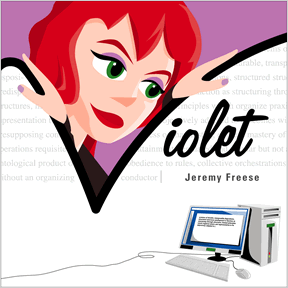![]()
 Violet is a richly engaging one-room puzzle game from this year's annual Interactive Fiction competition.
Violet is a richly engaging one-room puzzle game from this year's annual Interactive Fiction competition.
The problem? You're a graduate student working on your dissertation, but you haven't gotten any writing done in months. Your girlfriend Violet has put her life on hold, waiting for you to finish, and she's getting fed up. If you don't get a thousand words written today, your relationship is over and she flies home to Australia. Unfortunately, your office is full of every kind of distraction, from the window overlooking campus hijinx to the computer on your desk, always ready to show you the latest blogs and web comics instead of your chapter-in-progress. So you have no choice but to shut out everything that's causing you distraction so that you can turn in a few hours of solid work for once.
 Having been through graduate school myself, I found this cut close to home. The way the protagonist keeps half-intentionally sliding into other tasks... or getting distracted by totally irrelevant noises... or remembering books that s/he really ought to read before writing anything... it's all too familiar. The main difference between me and the protagonist of Violet is that I didn't have such a nice office. (I wrote the lion's share of my dissertation in a university district cafe, accompanied by copious amounts of bubble tea. Possibly due to the sudden loss of revenue, the cafe shut down about a month after I finished.) No surprise at all that Violet's author Jeremy Freese is an academic by profession.
Having been through graduate school myself, I found this cut close to home. The way the protagonist keeps half-intentionally sliding into other tasks... or getting distracted by totally irrelevant noises... or remembering books that s/he really ought to read before writing anything... it's all too familiar. The main difference between me and the protagonist of Violet is that I didn't have such a nice office. (I wrote the lion's share of my dissertation in a university district cafe, accompanied by copious amounts of bubble tea. Possibly due to the sudden loss of revenue, the cafe shut down about a month after I finished.) No surprise at all that Violet's author Jeremy Freese is an academic by profession.
The implementation is strong. Like last year's competition winner Lost Pig, Violet abounds with interesting responses even to silly or unexpected actions. There are built-in hints, too, which is helpful, since a few of the puzzles are a bit on the tricky side. To keep you focused, the status line reminds you what's currently standing between you and writing progress.
There's also some flexibility in the game, which makes it fun to tinker with even after you've finished the first time. While Violet is too strongly herself to be mutated, the player character's gender is up to you — you can play as a male in a straight relationship or as a gay female. That choice is not purely cosmetic, either: some of the backstory and at least one of the puzzles is altered depending on your choice.
Analysis: On puzzles and implementation alone, Violet would be a solid, entertaining piece of work. What makes this game a stand-out is the way it uses the parser as the voice of a whole other person.
Critics of interactive fiction sometimes complain about how cold and empty IF can be — interactive characters are hard to write convincingly, objects are easy, and there has historically been a tendency to write large abandoned landscapes in which only journal entries and photographs bear witness to the people who once lived there.
That generalization is less true now than it used to be — there are numerous works of interactive fiction that are primarily about people rather than things (including another one of my favorites from this competition, Everybody Dies). Some of them involve fairly sophisticated opportunities for conversation and other kinds of interaction. Violet, on the other hand, never presents you with your girlfriend in the flesh. Instead, everything you do or think of doing is narrated in Violet's voice: not because she's actually present, but because the player character can't help imagining what she would say at every moment. The entire game thus becomes a conversation with imaginary-Violet.
A few people may find the voice of the artistic, perky Violet a little too precious: she has hundreds of pet-names for the player character, some of which are deeply absurd. Personally, I found that she was wry enough that I didn't mind the terms of endearment and the cuteness of her self-presentation. While I might not date someone like this myself, I found her persuasive as a person, and I enjoyed her company for the duration of the game.
Ultimately, though, the formal invention of having the game speak in Violet's voice would not be worth much if the story weren't so well-observed. Violet presents you with a player character whose problems are entirely grounded in the real world, and a girlfriend who is quirky but believable. Both of them come out as seemingly-real folks. I'm tempted to compare Violet to a romantic comedy, but that doesn't do it justice: your average romantic comedy is about cooked-up misunderstandings between people too dumb to notice that they are cosmically destined to be together. The main characters of Violet have real feelings for one another, and a real investment in their relationship — and underneath the goofiness and the cute pet-names, their problem is plausible and serious.
The links above point to JIG's internally developed Flash-based Z-Machine interpreter (thanks asterick!), with the story files hosted here by kind permission of the game's author, Jeremy Freese. Basically that means you can now play these games in your browser rather than having to download and run the game in a standalone interpreter.
If you would rather download the game, you may do so at the Interactive Fiction database. If you choose to download the game, you will need an interpreter to read the z-file, just like most IF games: try Gargoyle for Windows, or Zoom for Macintosh and Unix.
If you like "Violet," take a look at other Interactive Fiction we have reviewed here at JIG.






Walkthrough Guide
(Please allow page to fully load for spoiler tags to be functional.)
Whee! For anyone stuck, here is a rough guide.
You are trying to write. Sit down at your desk, open your word processor, and write. When try to write you will find the things distracting you are:
1) A lack of energy
2) The Internet
3) The book on the bookshelf
4) Julia's loud conversation
5) The smell of Julia's perfume
6) The wrong music
7) The zombie/pirate/alien/mole people war out the window
8) The pen
9) Your clothes
10) You need to pee
To overcome the lack of energy:
- examine desk
- open drawer
- get key
- get notebook (this will help later)
- open cabinet
- get balloon (for later)
- get bottle (of energy drink)
- open bottle
- drink bottle
- write!
To eliminate the Internet:
- unplug blue cable
- put cable in cabinet (be sure you have balloon and empty bottle)
- lock cabinet
- stand on stool
- put key on bookcase
- climb down
- break stool
- write!
To eliminate the book:
- examine the window
- get the lighter
- get the book
- burn the book
- try again to burn the book
- write!
To eliminate Julia's loud conversation:
- pull the tab on the balloon from the cabinet
- read the square
- charge platypod
- get the gum from the wastebasket
- chew the gum
- put the gum in your ears
- once the platypod beeps, wear platypod
- scrunch forehead
- jiggle head clockwise
- write!
To eliminate Julia's perfume:
- examine desk
- get framed picture
- break frame
- get clamp
- clamp nose
- write!
To overcome the wrong music:
- while wearing platypod, raise left eyebrow until you are listening to Primrose Meanwell.
To overcome the zombie/pirate/alien/mole people distraction:
- close blind (doesn't work)
- fix blind (you need to be on your desk)
- get on desk
- examine blind
- fix blind
- pull cord (covers half the window)
- get trophy
- examine trophy
- unfold trophy (into sign)
- cover window with sign
- write!
To get the pen:
- examine cactus
- examine sprinkler
- tidy pile (the one on the desk)
- get potato gem
- examine square (the rubber one)
- remove chip
- put gem in pouch
- shoot gem at pen (fails)
- get snowglobe
- throw snowglobe at pen
- (really) throw snowglobe at pen
- get figurine
- put figurine in pouch
- shoot figurine at pen
- get pen
- write!
To overcome your stained, itchy clothes:
- strip
- write
To overcome your full bladder:
- pee on cactus
- write!
Tada!
Posted by: denied | November 18, 2008 5:41 PM